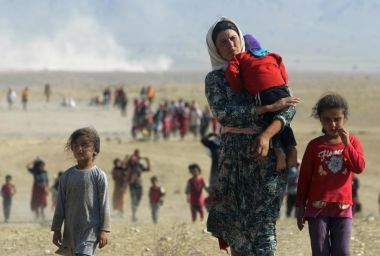How is rape used as a weapon of war?

Islamic State has institutionalised sexual violence and is using it systematically to advance its "key strategic objectives," the UN Special Representative on Sexual Violence in Conflict, Zainab Bangura, said last week. Stories of brutality and rape are emerging on an almost daily basis, and there is no doubt that sexual violence is being used as a "tactic of terrorism" by militants intent on establishing a Caliphate in the Middle East.
Rape as a weapon of war is, of course, nothing new. According to the UN Development Fund for Women (UNIFEM, now UN Women), "Violence against women during or after armed conflicts has been reported in EVERY international or non-international war-zone". It is routinely used both indiscriminately and systematically by individuals and groups to terrorise, demean and control. "It is now more dangerous to be a woman than to be a soldier in modern conflict," said Major-General Patrick Cammaert, former military advisor to the UN, in 2008.
On a recent trip to Syria, Iraq, Turkey, Lebanon and Jordan, Bangura met women who have escaped ISIS captivity, and heard numerous stories of forced marriage, sexual slavery and rape. One victim described being forced to undergo vaginal surgery to 'restore her virginity' over 20 times; married off to a different militant after each procedure. Guidelines issued by ISIS specify how violence is to be used against female slaves, and state that it is permissible to have intercourse even with those who haven't yet reached puberty. According to aid workers, a nine-year-old Yazidi girl was recently found to be pregnant after being raped by at least 10 Islamic State militants, and a report by Amnesty International last December said young women were committing suicide out of fear of how they would be treated by jihadists.
"Girls are literally being stripped naked and examined in slave bazaars...categorized and shipped naked off to Raqqa or Mosul or other locations to be distributed among ISIL leadership and fighters," Bangura told reporters.
"ISIL have institutionalized sexual violence and the brutalization of women as a central aspect of their ideology and operations, using it as a tactic of terrorism to advance their key strategic objectives."
Tearfund's Katie Harrison has met women who have undergone similar traumas all over the world. Most recently in the Middle East, but also in Central African Republic (CAR), Democratic Republic of Congo (DRC), Uganda, South Sudan and Rwanda.
"Rape is, of course, one of the oldest tricks in the book to absolutely terrify," she told Christian Today. "It has an immediate effect of terror – it's a way of getting somebody to move, or do what you want them to do." One woman in CAR – a country beset by rebel violence – told Harrison that three soldiers ripped her clothes off and raped her, one by one, in an open field until she lost consciousness. Others have described sex slave markets in Iraq, where women are 'tested' to assess their virginity and given a price-tag accordingly. Girls as young as three are sold and taken away to be abused.
In a piece for Christian Today, Harrison described sexual violence as "fundamental to many conflicts."
"It's not random or opportunistic, and it's not about sexual gratification," she wrote. "It's a sinister abuse of power, designed to kill people's spirits and ruin the fabric of families and communities. It changes the lives of individuals and communities forever, and takes those people years to recover."
She explained that there is a "legacy" of rape that extends far beyond the immediate victim, and can therefore be used to devastate entire neighbourhoods. Traumatised women are often cast out by their communities; the shame of a relative being raped is too much for some families to handle. There are physical signs of abuse too – some women are rendered incontinent, and others physically injured for life.
"Huge damage is done to families," Harrison said. "You can go anywhere in the world, and what people are looking for is family, work and education – those are the ways out of poverty." In tearing apart families and breaking trust, perpetrators of sexual violence can decimate communities and even set them back economically. "You destroy communities. You punish the men, and you punish the women, doing it in front of the men," Cammaert has said.
Sexual violence can also be normalised by war, Harrison added. Church leaders in Rwanda have told her that sexual violence has actually increased since the genocide, more than 20 years on. When masculinity is defined in a way that is aggressive and controlling, people "forget what life was like before". Not only does this impact female victims, but it can also have long-lasting, devastating consequences for those who perpetuate the violence. Harrison met a young man in Uganda who was taken as a child soldier and taught to rape by his superiors when he was aged just nine. "I had to conquer women who were like my mother," he said. Now 20 years old, he cried throughout the interview.
"It's clearly an organised, systematic part of many conflicts," Harrison said, though noting that sexual violence is used variably in different situations. "It has a legacy that's much more long-lasting than the moment, because rape is a total misuse of sex, and isn't about sex [in itself] at all."
The Church must be leading in the fight against all kinds of sexual abuse, she added. "As you can expect, it can deeply affect marriages, intimiate relationships, the way that you relate to children...and even spiritually it's an attack on the heart of what it is to love and be loved.
"We need to help churches in different countries to teach positively about family, marriage and sex, and set an example in helping people to heal."











